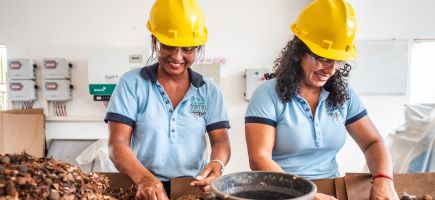

Management services: Achieving success with a strong management team
In Tunisia, young managers are building their careers – and making the country an attractive location for industrial enterprises from Germany.
When Abdelwahed Mezni joined Gruner AG in 2018, he started off working on the shop floor, maintaining machines, monitoring production and checking the finished components. In Tunisia, Gruner – a German company headquartered in the state of Baden-Württemburg – manufactures coils and electromagnets, which are vital components of many devices ranging from magnetic resonance scanners through to door openers and electric motors. Abdelwahed was quickly promoted, initially to team leader – and he now coordinates an international team tasked with developing new and better coils and having them produced. ‘A crucial factor in my career development was the Tunisian Automotive Management Academy – TAMA for short,’ says Abdelwahed today.
The management academy was set up in 2019 by the Tunisian Automotive Association (TAA) with support from the Deutsche Gesellschaft für Internationale Zusammenarbeit (GIZ) GmbH. Four medium-sized companies from Germany with plants in Tunisia and members of TAA realised that they needed qualified managers – shift supervisors, plant managers and human resource managers – if they were going to be able to expand their local operations. TAMA now trains these managers: almost 2,000 employees from around 50 German, European and Tunisian companies in the automotive, electronics and aerospace sectors have since taken part in the programmes of TAMA.

Benefits for Tunisian firms
Tunisia has become an attractive location for German companies. Cables, onboard electronics, textiles and increasingly software too – many firms are manufacturing goods here for their global supply chains. The proximity to Europe, highly skilled workers and competitive wage costs are attracting foreign direct investment. Around 7,500 engineers graduate from university in the country every year. Figures compiled by the African Centre for Economic Transformation show that Tunisia exports more industrial goods to the European Union than any other African country.
Under the Special Initiative ‘Decent Work for a Just Transition’ launched by the German Federal Ministry for Economic Cooperation and Development (BMZ), GIZ is collaborating with Tunisia’s Ministry of Industry and industry associations to create an attractive investment climate, organise the transition to climate-friendly production and develop innovations. This not only benefits German firms by improving the conditions in Tunisia. A strong economy in Tunisia also creates jobs and prospects for the people in the country. Since 2020, with support from GIZ, around 4,500 jobs in industry have been created in which workers are paid more than the minimum wage and enjoy social protection.

Teaching soft skills
Tunisian firms are also drawing on this support. One such company is Coficab, one of the world’s leading cable manufacturers. Myriam Elloumi, Coficab’s Chief Corporate Affairs & Sustainability Officer, also sends the company’s prospective managers to the academy. Here, they attend standard training courses certified by the Quality Management Center of the German Association of the Automotive Industry (VDA) – which is important for companies wishing to sell their products to German car manufacturers. Elloumi is also President of the Tunisian Automotive Association (TAA), to which the academy now belongs. ‘Tunisian professionals are already very well trained,’ says Elloumi. ‘In addition to the important technical trainings, they also learn soft skills at TAMA.’ During the three- to four-day courses, trainers teach participants how to establish a corporate culture, lead a diverse team and organise production processes efficiently and safely. In addition to lecture-style teaching, the training also includes group work, role play and practical examples.
Through group learning at TAMA, Abdelwahed Mezni from Gruner AG found out about Scrum, for example – a method that he now uses in his work to improve products quickly and continually in short cycles. His colleague Khouloud Chaabane, who works at Gruner in HR development, attended communication and management training sessions. She now uses the methods she learned for HR development in her own company.
Nabil Rihani is Plant General Manager at Gruner in Tunisia. ‘We have grown considerably in the past five years and the demands made of us have increased,’ he explains, adding that new production lines and entire organisational units have been set up. ‘For organisational development to function, you need a strong management team that identifies with the company,’ he says. Rihani has nothing but praise for his managers such as Abdelwahed Mezni and Khouloud Chaabane. ‘With the right people, we can produce any component and work with any material – and then we can manage anything.’


